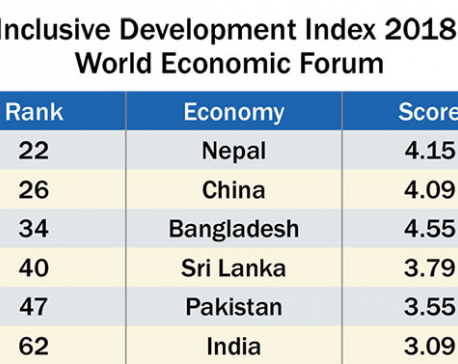
OR
Inclusive Growth and Development Report-2017
Nepal tops regional ranking in inclusive development index
Published On: January 18, 2017 10:23 AM NPT By: Kuvera Chalise | @@kchalise

KATHMANDU, Jan 18: Nepal is not only advancing -- in the last five years -- in the Inclusive Development Index (IDI) but also ranks first in the South Asian region, a global report published on Tuesday shows.
“Under the developing economies category, with overall score of 4.24, Nepal ranks 27th on the IDI, showing remarkable improvement over the last five years,” the Inclusive Growth and Development Report-2017 published by the World Economic Forum (WEF) reads.
“Nepal ranks 26th in Growth with a score of 3.35, whereas the country ranks 51st in Inclusion with a score of 3.25, but ranks 1st in Intergenerational Equity with a score of 6.11.”
“Intergenerational equity, which refers to whether economic performance is being pursued at the expense of future generations, is another limitation of GDP. Increasing output, which at first glance would be “good” for GDP, may come at the expense of externalities such as environmental damage, reduced leisure time, or the depletion of natural resources. In other words, there is no link between GDP and the sustainability of the economy,” the report says.
Though the country is ranked second to Lesotho -- under the developing economies -- for most improved five-year trend, it far below at 72 in GDP per capita, the report adds.
“Nepal, among the six countries, registered IDI scores that are 20 or more places higher than its GDP per capita rankings, suggesting that its development model is considerably more balanced and inclusive than that of countries with a comparable national income per capita.”
Notably, Nepal’s poverty rate has declined by 25 percentage points in this time, and its income inequality -- net income Gini -- by almost 8 percentage points, it reads, adding that Nepal outperforms all others on the intergenerational equity pillar during the most recent year, and has relatively low unemployment, including youth unemployment, and strong female participation in the workforce. “However, it performs poorly on GDP per capita and labor productivity.”
The framework indicates that the informal sector is dogged by low wages, leaving many workers in poverty. Priority areas include tackling corruption and administrative barriers to starting and growing a business, as well as continuing to improve infrastructure and basic services including education -- particularly the availability and quality of vocational training, the report added
Regionally, Nepal ranked 27th is followed by Bangladesh at 36th, Sri Lanka at 39th, Pakistan at 52nd and India at 60th in the IDI -2017.
The Inclusive Development Index (IDI) has been calculated by giving equal weight to the three pillars -- growth, inclusion, and intergenerational equity -- as well as the 12 indicators therein. However, if the bottom-line measure of national economic performance is sustained, broad-based progress in living standards, then a case could be made that the indicator or indicators that most closely approximate this concept should be weighted more heavily.
As measured by household surveys, median household income is attracting growing interest as an alternative to GDP per capita, the more commonly cited measure of a country’s material wellbeing. One drawback with GDP per capita is that it takes no account of distribution: it simply divides a nation’s income by the size of its population, the report states, adding, “If inequality in that country is very high, the resulting figure will provide a misleadingly optimistic suggestion of living standards for most individuals.”
Analysis of the 12 Key Performance Indicators (KPIs) that comprise the Inclusive Development Index, alongside the seven pillars of Policy and Institutional Indicators, suggests that median household income is indeed a reasonable proxy for inclusive growth and development as a whole even though it captures only one of the four dimensions of broad-based progress in living standards -- income; opportunity; security; and quality of life -- emphasized in the report.
You May Like This

Nepal jumps 5 notches to 22nd position in inclusive development index
KATHMANDU, Jan 23: Nepal has inched up five notches to 22nd position in the 2018 Inclusive Development Index (IDI) of World... Read More...

Nepal takes lead in strengthening aid effectiveness agenda in development cooperation
KATHMANDU, July 6: Taking a leadership role in ensuring the effectiveness of the foreign aid which reaches the underdeveloped countries, Nepal... Read More...

UK wants peaceful, inclusive and broadly-supported polls in Nepal
KATHMANDU, June 26: The United Kingdom (UK) has called on all stakeholders to create necessary conditions to allow the people... Read More...





Just In
- Save the Children report highlights severe impact of air pollution on children
- NATO Serving as a Catalyst to Fuel Violence
- Home Minister denies any delay in providing relief to wildfire and fire victims
- Ties with Tehran
- CM Kandel requests Finance Minister Pun to put Karnali province in priority in upcoming budget
- Australia reduces TR visa age limit and duration as it implements stricter regulations for foreign students
- Govt aims to surpass Rs 10 trillion GDP mark in next five years
- Govt appoints 77 Liaison Officers for mountain climbing management for spring season













Leave A Comment